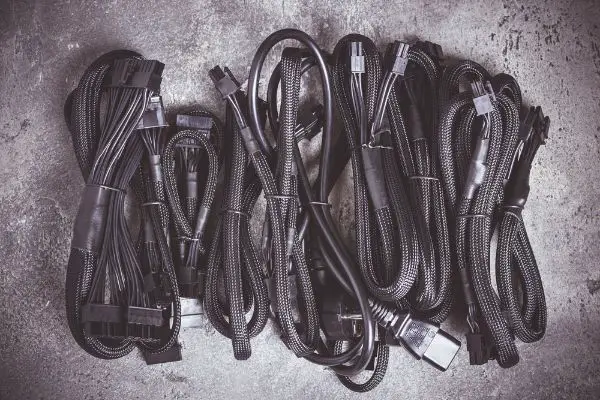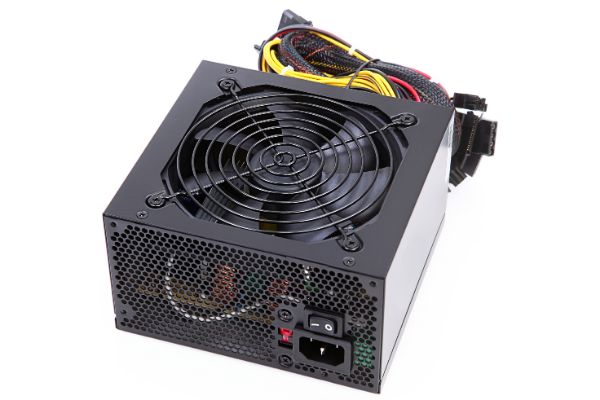Disclaimer: This post may contain affiliate links, meaning we get a small commission if you make a purchase through our links, at no cost to you. For more information, please visit our Disclaimer Page.
Your computer comes with a power supply unit that sends out the energy other components need in order to function properly. Often abbreviated as a PSU, this unit connects to different hardware in your computer via special cables.
It is sometimes necessary to change or replace the cables for effectiveness, and many people wonder about compatibility or possible damage to their computers when doing this. We’ll take you through the basics of PSU power cords, how they work, and what kinds are okay to use in your machine.

Table of Contents
Do All PSUs Use the Same Power Cord?
In most cases, the types of power cords that supply units use are quite standardized. However, there are some things to keep in mind with PSU cords. One of the major ways PSU-use varies is by region.
Different regions around the world may use various power grid setups. In these cases, you may find PSU power cords with different connectors to accommodate the plugs they will use to draw their power from the grid.
If you are merely replacing the power cords for your supply unit from a single region, you most likely won’t have an issue purchasing and installing a standard PSU power cord. However, there are possible differences with modular power cords that we will get to in another section.
Based on the grid you are using, keep in mind it is best to purchase power cords that can handle the draw of the energy coursing through them. This tip will be important to remember if you plan to purchase power supply cords from a different region and have them shipped to you.
In short, PSU power cables from the same region should suffice for your power supply.
Does It Matter What Cable You Use for PSU?
Most importantly, the cables you use for the PSU will not matter if you keep a few basic things in mind.
Before we continue, we should note the distinction between power cords or cables for the PSU and PSU cords that connect to your computer’s motherboard. In the latter case, the cables used there matter and are made with specifications that we do not recommend messing around with.
On the other hand, a cable that you’re using to power the PSU itself is more standardized. You most likely will not have a problem finding one that will work just fine from a reputable brand.
If you are unsure which brands make good cables that can handle the load from your PSU, there are forums or groups of enthusiasts who have studied the issue in-depth and would be happy to make recommendations. For the most part, power cables across regions are meant to be as standardized as possible if you need to swap them out.
Just make sure that the cord you choose is not extremely cheap or has a very low amp rating. Your PSU won’t need a lot of amps, but many of the cords on the very low end only pull five or seven amps. Find a cord that can sustain at least 10 amps for the best results.
What Happens if You Use a Different PSU Cable?
The precise answer to this question depends on how different the new cable is from the one you’ve been using. Any standard power cables should work fine as long as the connectors match up and the amp ratings can handle the power loads.
Generally, it is best to use whatever cables that originally came with your PSU. If you need to switch the cables for any reason, you should find the specs for the make and model of your PSU and purchase the appropriate cables.
Various manufacturers may wire their PSU cables differently from one another. This difference in wiring can make it risky to use PSU cables from manufacturers other than the one that built your power supply unit. At best, the cable itself simply will not work to power your PSU.
At worst, the wrong cable in this situation could damage you rig’s PSU, the motherboard, and other parts. For the safest results, always try to match the cables with the ones that come from or are recommended by the manufacturer of your PSU, including its exact model.
Are Modular PSU Cables Universal?
Some people opt for modular power supply units instead of traditional ones. Simply put, a standard power supply unit will come with all its cables and connectors attached via soldering to the circuit board. Conversely, a modular power supply comes with cables and connectors you that you can detach as needed. Because of this ability to detach connections at various points, there is some confusion around modular PSU cables and their interchangeability.
Modular PSU cables are not typically universal. The modular nature of these PSUs gives users some freedom, but not with the types of cables for the power supply itself. Earlier, we mentioned earlier some specifics of standardized cables and cords. The issue that can crop up with modular PSUs and their cables is that there is no standard among them.
In cases like these, the cables you examine from different brands or modular PSU models may look similar at first glance. However, different cables from those already part of your PSU could have a different pinout setup that does not match the ones on the PSU itself. This means that the other modular cables may not provide the correct voltage to the proper pins once they are connected and powered up.
Modular PSU cables are not universal, and serious problems can arise if you try to mix and match them. If you are ever in doubt, check with various knowledge bases to get advice before doing anything about these cables.

Is It Safe To Change PSU Cables?
There may come a time when you need to swap out the cables for your PSU. You might need new cables for effectiveness, or you may wish to change them up for aesthetic purposes. Either one is fine, but there are a few things to keep in mind.
It is perfectly safe to change PSU cables as long as you keep certain standards in mind and esure the cables are compatible with your PSU.
In most cases, one of the best ways to do this is to get cables that are rated and tested for the brand and model of the PSU that you have. However, it is important to remember that even cables coming from the same brand might not be the right kind for your PSU.
It’s always a good idea to double-check whether specific cables you’re interested in could be a good fit for your PSU. Using improper cables could have a few results.
1. Nothing connects because the layouts are different. In these cases, there would be no current flow or damage to the PSU or other components. Nothing will work, but you would be fine as long as you acquired appropriate cables for the make and model of the PSU.
2. The cables connect, but the pinouts differ from what they should be for your PSU. In these cases, polarities could be reversed, voltages will be wrong, or damage to your computer and its parts could occur. So, while it is safe for you to replace PSU cables, it requires some knowledge of which PSU you are using and its requirements.
Conclusion
Power supply units are essential components in your devices, and there is freedom in setting them up and getting them the juicethey need. For power cords themselves, any standardized cord for your region should do the trick nicely.
The thing to remember here is to choose a cord that is rated to hold the load that your power supply will use. While this load is not high, it is best to go with an adequately priced and well-rated cord.
For other cables that are part of the PSU, a bit more care might be needed. Non-modular PSUs have some standard connections within each brand that can make replacing the cables a relatively simple affair. Conversely, non-modular cables are not standardized, and you should not try to mix and match them with your model of PSU.
